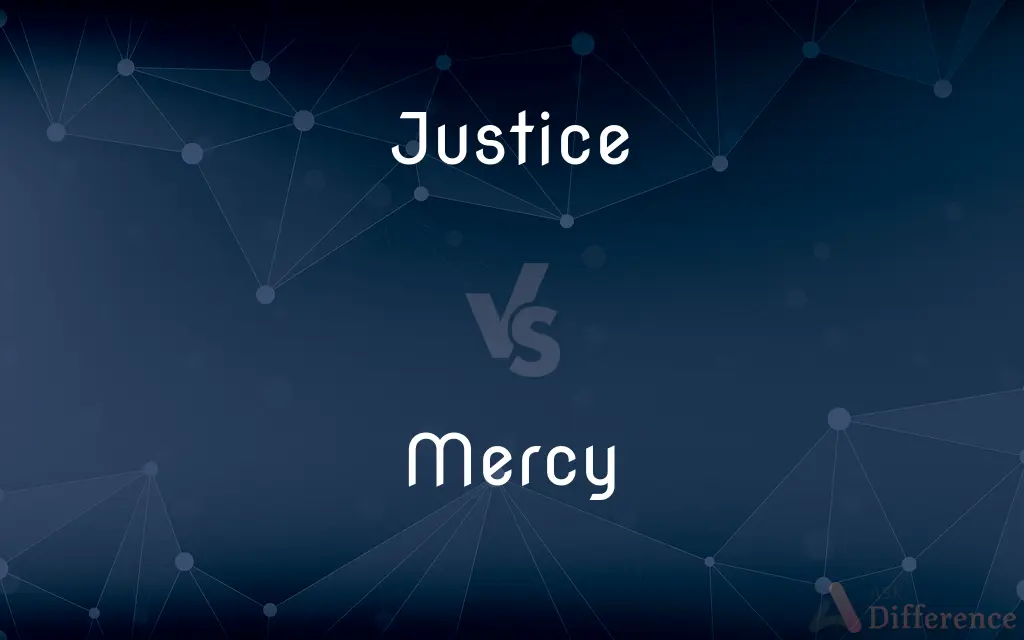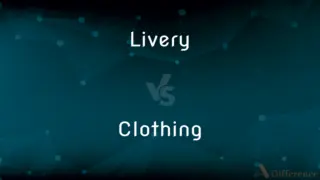Justice vs. Mercy — What's the Difference?
By Tayyaba Rehman — Updated on October 13, 2023
Justice is the fair application of law and principle, while Mercy involves compassion and leniency, often foregoing punishment.

Difference Between Justice and Mercy
Table of Contents
ADVERTISEMENT
Key Differences
Justice and Mercy are two essential concepts that often interplay in moral and legal contexts. Justice involves ensuring that every individual gets what they deserve, based on law or fairness. It signifies fairness, equality, and the right application of rules. In contrast, Mercy is the compassionate treatment of those in distress, particularly those who have done wrong. It's a form of leniency, showing kindness even when punishment is warranted.
Justice is often represented by the scales, signifying balance and impartiality. It's an objective concept, where actions are weighed against standards, rules, or laws, and corresponding consequences are applied. Mercy, however, is more subjective, rooted in compassion and understanding. It often requires one to look beyond the action and consider the circumstances or the individual.
In the justice system, these concepts frequently intersect. A judge might deliver a just verdict based on evidence and law but can also show mercy in sentencing, considering factors like remorse or first offenses. Justice ensures order and accountability in society, while Mercy brings in the human element, recognizing that every situation is unique.
While both Justice and Mercy are virtuous and necessary, they can sometimes be at odds. Pure justice might seem cold or harsh without the tempering effect of mercy, while excessive mercy might undermine the principles of justice and accountability. Striking a balance between the two is often the key to fair and compassionate governance.
Comparison Chart
Nature
Objective
Subjective
ADVERTISEMENT
Based on
Law, fairness, principles
Compassion, leniency
Representation
Scales (balance, impartiality)
Compassionate figure or gesture
Outcome
Deserved consequences
Often reduced consequences or forgiveness
Role in Judicial System
Verdict based on evidence and law
Leniency in sentencing or forgiveness
Compare with Definitions
Justice
The administration of law.
The justice system sometimes fails the very people it aims to protect.
Mercy
Compassionate treatment, especially of those in distress.
She showed mercy to the injured bird by caring for it.
Justice
The quality of being just or fair.
The movement fights for justice and equality.
Mercy
Divine forgiveness or compassion.
Many pray for mercy and blessings from above.
Justice
Retribution or reward.
He felt that getting the job was justice for all his hard work.
Mercy
Mercy (Middle English, from Anglo-French merci, from Medieval Latin merced-, merces, from Latin, "price paid, wages", from merc-, merxi "merchandise") is benevolence, forgiveness, and kindness in a variety of ethical, religious, social, and legal contexts. In the social and legal context, mercy may refer both to compassionate behavior on the part of those in power (e.g.
Justice
Justice, in its broadest sense, is the principle that people receive that which they deserve, with the interpretation of what then constitutes "deserving" being impacted upon by numerous fields, with many differing viewpoints and perspectives, including the concepts of moral correctness based on ethics, rationality, law, religion, equity and fairness. Consequently, the application of justice differs in every culture.
Mercy
Compassion or forgiveness shown towards someone whom it is within one's power to punish or harm
The boy was screaming and begging for mercy
The mercies of God
Justice
The quality of being just; fairness
In the interest of justice, we should treat everyone the same.
Mercy
Used in expressions of surprise or fear
‘Mercy me!’ uttered Mrs Diggory
Justice
The principle of moral rightness; decency.
Mercy
Compassionate treatment, especially of those under one's power; clemency.
Justice
Conformity to moral rightness in action or attitude; righteousness
Argued for the justice of his cause.
Mercy
A disposition to be kind and forgiving
A heart full of mercy.
Justice
The attainment of what is just, especially that which is fair, moral, right, merited, or in accordance with law
My client has not received justice in this hearing.
Mercy
Something for which to be thankful; a blessing
It was a mercy that no one was hurt.
Justice
(Law) The upholding of what is just, especially fair treatment and due reward in accordance with honor, standards, or law
We seek justice in this matter from the court.
Mercy
Alleviation of distress; relief
Taking in the refugees was an act of mercy.
Justice
The administration, system, methods, or procedures of law
A conspiracy to obstruct justice.
A miscarriage of justice.
Mercy
(uncountable) Relenting; forbearance to cause or allow harm to another.
She took mercy on him and quit embarrassing him.
Justice
Conformity to truth, fact, or sound reason
The overcharged customer was angry, and with justice.
Mercy
(uncountable) Forgiveness or compassion, especially toward those less fortunate.
Have mercy on the poor and assist them if you can.
Justice
Abbr. J.(Law) A judge on the highest court of a government, such as a judge on the US Supreme Court.
Mercy
(uncountable) A tendency toward forgiveness, pity, or compassion.
Mercy is one of his many virtues.
Justice
The state or characteristic of being just or fair.
The justice of a description
Mercy
(countable) Instances of forbearance or forgiveness.
Psalms 40:11 Do not withhold Your tender mercies from me, O Lord
Justice
The ideal of fairness, impartiality, etc., especially with regard to the punishment of wrongdoing.
Justice was served.
Mercy
(countable) A blessing; something to be thankful for.
It was a mercy that we were not inside when the roof collapsed
Justice
Judgment and punishment of a party who has allegedly wronged another.
To demand justice
Mercy
(uncountable) A children's game in which two players stand opposite with hands grasped and twist each other's arms until one gives in.
Justice
The civil power dealing with law.
Ministry of Justice
The justice system
Mercy
To feel mercy
Justice
A title given to judges of certain courts; capitalized when placed before a name.
Mr. Justice Krever presides over the appellate court
Mercy
To show mercy; to pardon or treat leniently because of mercy
Justice
Correctness, conforming to reality or rules.
Mercy
Expressing surprise or alarm.
Mercy! Look at the state of you!
Justice
The quality of being just; conformity to the principles of righteousness and rectitude in all things; strict performance of moral obligations; practical conformity to human or divine law; integrity in the dealings of men with each other; rectitude; equity; uprightness.
Justice and judgment are the haditation of thy throne.
The king-becoming graces,As justice, verity, temperance, stableness, . . . I have no relish of them.
Mercy
Forbearance to inflict harm under circumstances of provocation, when one has the power to inflict it; compassionate treatment of an offender or adversary; clemency.
Examples of justice must be made for terror to some; examples of mercy for comfort to others.
Justice
Conformity to truth and reality in expressing opinions and in conduct; fair representation of facts respecting merit or demerit; honesty; fidelity; impartiality; as, the justice of a description or of a judgment; historical justice.
Mercy
Compassionate treatment of the unfortunate and helpless; sometimes, favor, beneficence.
Justice
The rendering to every one his due or right; just treatment; requital of desert; merited reward or punishment; that which is due to one's conduct or motives.
This even-handed justiceCommends the ingredients of our poisoned chaliceTo our own lips.
Mercy
Disposition to exercise compassion or favor; pity; compassion; willingness to spare or to help.
In whom mercy lacketh and is not founden.
Justice
Agreeableness to right; equity; justness; as, the justice of a claim.
Mercy
A blessing regarded as a manifestation of compassion or favor.
The Father of mercies and the God of all comfort.
Justice
A person duly commissioned to hold courts, or to try and decide controversies and administer justice.
Mercy
Leniency and compassion shown toward offenders by a person or agency charged with administering justice;
He threw himself on the mercy of the court
Justice
To administer justice to.
Mercy
A disposition to be kind and forgiving;
In those days a wife had to depend on the mercifulness of her husband
Justice
The quality of being just or fair
Mercy
The feeling that motivates compassion
Justice
The administration of law; the act of determining rights and assigning rewards or punishments;
Justice deferred is justice denied
Mercy
Something for which to be thankful;
It was a mercy we got out alive
Justice
A public official authorized to decide questions bought before a court of justice
Mercy
Alleviation of distress; showing great kindness toward the distressed;
Distributing food and clothing to the flood victims was an act of mercy
Justice
The United States federal department responsible for enforcing federal laws (including the enforcement of all civil rights legislation); created in 1870
Mercy
Compassion or forgiveness shown to someone.
He pleaded for mercy after admitting his mistake.
Justice
Fairness in action or judgment.
Everyone deserves justice, regardless of their background.
Mercy
Leniency or clemency.
The ruler was known for his acts of mercy towards prisoners.
Justice
The legal system's process.
The case will be tried in the halls of justice.
Mercy
A blessing or something to be thankful for.
Surviving the accident was a mercy in itself.
Common Curiosities
Is Justice always punitive?
No, justice aims to be fair, which might involve punishment or reward, depending on the context.
Can there be Justice without Mercy?
While possible, justice without mercy might come across as harsh or uncompassionate.
Can excessive Mercy undermine Justice?
Yes, if mercy is applied without regard for accountability, it can compromise the principles of justice.
What symbolizes Justice?
Justice is often symbolized by scales, representing balance and impartiality.
What does Mercy emphasize?
Mercy emphasizes compassion, leniency, and often the forgiveness of wrongdoing.
Can Justice and Mercy coexist?
Yes, they can coexist, as seen when a fair verdict (justice) is paired with a lenient sentence (mercy).
Why is Mercy considered subjective?
Mercy is based on personal feelings of compassion, which can vary from one individual to another.
Can Justice be subjective?
While justice aims to be objective, human interpretation and biases can introduce subjectivity.
What is the primary function of Justice?
Justice ensures fairness, equality, and the proper application of laws.
Is Mercy always about forgiving mistakes?
No, mercy can also be about showing compassion in various situations, not just when a mistake is made.
What does "at the mercy of" mean?
It means being in someone's power or being vulnerable to something.
Are Justice and Mercy values or actions?
They are both values and actions. They represent ideals and can also manifest in tangible ways.
How is Justice applied in society?
Through laws, regulations, and the judicial system, ensuring order and fairness.
Why is Mercy important in the justice system?
Mercy brings a human element to judgments, acknowledging individual circumstances and promoting rehabilitation.
Share Your Discovery

Previous Comparison
Livery vs. Clothing
Next Comparison
Buddha vs. ChristAuthor Spotlight
Written by
Tayyaba RehmanTayyaba Rehman is a distinguished writer, currently serving as a primary contributor to askdifference.com. As a researcher in semantics and etymology, Tayyaba's passion for the complexity of languages and their distinctions has found a perfect home on the platform. Tayyaba delves into the intricacies of language, distinguishing between commonly confused words and phrases, thereby providing clarity for readers worldwide.













































